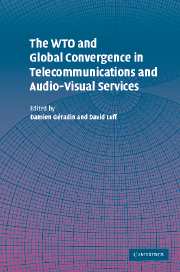Book contents
- Frontmatter
- Contents
- List of contributors
- Foreword
- Acknowledgments
- PART I Introduction
- PART II International regulation of telecommunications services
- 2 Telecommunications and audio-visual services in the context of the WTO: today and tomorrow
- 3 Current international trade rules relevant to telecommunications services
- 4 Accounting rates, cross-border services and the next WTO round on basic telecommunications services
- 5 Reforming international accounting rates: a developing country perspective
- 6 Levelling the playing field: is the WTO adequately equipped to prevent anti-competitive practices in telecommunications?
- PART III International regulation of audio-visual services
- PART IV Towards convergence?
- Index
2 - Telecommunications and audio-visual services in the context of the WTO: today and tomorrow
from PART II - International regulation of telecommunications services
Published online by Cambridge University Press: 25 February 2010
- Frontmatter
- Contents
- List of contributors
- Foreword
- Acknowledgments
- PART I Introduction
- PART II International regulation of telecommunications services
- 2 Telecommunications and audio-visual services in the context of the WTO: today and tomorrow
- 3 Current international trade rules relevant to telecommunications services
- 4 Accounting rates, cross-border services and the next WTO round on basic telecommunications services
- 5 Reforming international accounting rates: a developing country perspective
- 6 Levelling the playing field: is the WTO adequately equipped to prevent anti-competitive practices in telecommunications?
- PART III International regulation of audio-visual services
- PART IV Towards convergence?
- Index
Summary
I have been asked to discuss the negotiating history of the WTO Basic Telecommunications Agreement. As interesting as that topic is, it seems more useful to try to put it in the context of the prospects for a similar agreement for audio-visual services.
At the end of the Uruguay Round in 1993, the conclusion of the General Agreement on Trade in Services was surely one of the new World Trade Organization's greatest achievements. After all, services account for more than 50 per cent of developed economies and so bringing services within the international trading system was an important step forward. That achievement was diminished, however, by the failure of Members to agree to market access commitments in basic telecommunications services and several other important services sectors (most notably financial services). Out of more than 120 Members at the time, only one had made significant market access commitments for basic telecommunications services and it later turned out this was an accident. In contrast, in the field of value-added telecommunications services, fifty-seven Members had made commitments to provide market access for a wide range of services with relatively few market access limitations.
Why was there such a difference in the treatment of value-added and basic services? Value-added services were a small percentage of the overall telecommunications industry at the time and, in perhaps all of the fiftyseven countries that made market access commitments, the provision of these services had already been liberalised. Thus, the value-added telecom commitments essentially constituted a status quo agreement.
- Type
- Chapter
- Information
- Publisher: Cambridge University PressPrint publication year: 2004
- 3
- Cited by



